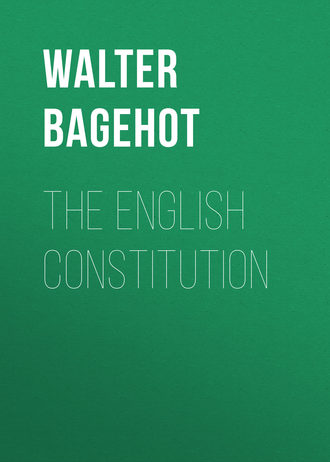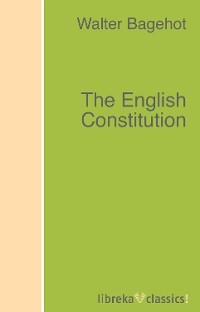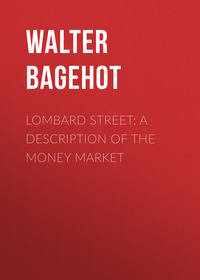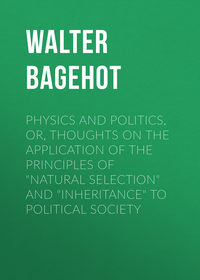 полная версия
полная версияThe English Constitution
This was the result of what I insist on tediously, but what is most necessary to insist on, for it is a cardinal particular in the whole topic. Many of the English people—the higher and more educated portion—had come to comprehend the nature of constitutional government, but the mass did not comprehend it. They looked to the sovereign as the Government, and to the sovereign only. These were carried forward by the magic of the aristocracy and principally by the influence of the great Whig families with their adjuncts. Without that aid reason or liberty would never have held them.
Though the rule of Parliament was definitely established in 1688, yet the mode of exercising that rule has since changed. At first Parliament did not know how to exercise it; the organisation of parties and the appointment of Cabinets by parties grew up in the manner Macaulay has described so well. Up to the latest period the sovereign was supposed, to a most mischievous extent, to interfere in the choice of the persons to be Ministers. When George III. finally became insane, in 1810, every one believed that George IV., on assuming power as Prince Regent, would turn out Mr. Perceval's Government and empower Lord Grey or Lord Grenville, the Whig leaders, to form another. The Tory Ministry was carrying on a successful war—a war of existence—against Napoleon; but in the people's minds, the necessity at such an occasion for an unchanged Government did not outweigh the fancy that George IV. was a Whig. And a Whig it is true he had been before the French Revolution, when he lived an indescribable life in St. James's Street with Mr. Fox. But Lord Grey and Lord Grenville were rigid men, and had no immoral sort of influence. What liberalism of opinion the Regent ever had was frightened out of him (as of other people) by the Reign of Terror. He felt, according to the saying of another monarch, that "he lived by being a royalist". It soon appeared that he was most anxious to retain Mr. Perceval, and that he was most eager to quarrel with the Whig Lords. As we all know, he kept the Ministry whom he found in office; but that it should have been thought he could then change them, is a significant example how exceedingly modern our notions of the despotic action of Parliament in fact are.
By the steps of the struggle thus rudely mentioned (and by others which I have no room to speak of, nor need I), the change which in the Greek cities was effected both in appearance and in fact, has been effected in England, though in reality only, and not in outside. Here, too, the appendages of a monarchy have been converted into the essence of a republic; only here, because of a more numerous heterogeneous political population, it is needful to keep the ancient show while we secretly interpolate the new reality.
This long and curious history has left its trace on almost every part of our present political condition; its effects lie at the root of many of our most important controversies; and because these effects are not rightly perceived, many of these controversies are misconceived.
One of the most curious peculiarities of the English people is its dislike of the executive government. We are not in this respect "un vrai peuple moderne," like the Americans. The Americans conceive of the executive as one of their appointed agents; when it intervenes in common life, it does so, they consider, in virtue of the mandate of the sovereign people, and there is no invasion or dereliction of freedom in that people interfering with itself. The French, the Swiss, and all nations who breathe the full atmosphere of the nineteenth century, think so too. The material necessities of this age require a strong executive; a nation destitute of it cannot be clean, or healthy, or vigorous, like a nation possessing it. By definition, a nation calling itself free should have no jealousy of the executive, for freedom means that the nation, the political part of the nation, wields the executive. But our history has reversed the English feeling: our freedom is the result of centuries of resistance, more or less legal, or more or less illegal, more or less audacious, or more or less timid, to the executive government. We have, accordingly, inherited the traditions of conflict, and preserve them in the fulness of victory. We look on State action, not as our own action, but as alien action; as an imposed tyranny from without, not as the consummated result of our own organised wishes. I remember at the census of 1851 hearing a very sensible old lady say that the "liberties of England were at an end"; if Government might be thus inquisitorial, if they might ask who slept in your house, or what your age was, what, she argued, might they not ask and what might they not do?
The natural impulse of the English people is to resist authority. The introduction of effectual policemen was not liked; I know people, old people, I admit, who to this day consider them an infringement of freedom, and an imitation of the gendarmes of France. If the original policemen had been started with the present helmets, the result might have been dubious; there might have been a cry of military tyranny, and the inbred insubordination of the English people might have prevailed over the very modern love of PERFECT peace and order. The old notion that the Government is an extrinsic agency still rules our imaginations, though it is no longer true, and though in calm and intellectual moments we well know it is not. Nor is it merely our history which produces this effect; we might get over that; but the results of that history co-operate. Our double Government so acts: when we want to point the antipathy to the executive, we refer to the jealousy of the Crown, so deeply embedded in the very substance of constitutional authority; so many people are loth to admit the Queen, in spite of law and fact, to be the people's appointee and agent, that it is a good rhetorical emphasis to speak of her prerogative as something NON-popular, and therefore to be distrusted. By the very nature of our government our executive cannot be liked and trusted as the Swiss or the American is liked and trusted.
Out of the same history and the same results proceed our tolerance of those "local authorities" which so puzzle many foreigners. In the struggle with the Crown these local centres served as props and fulcrums. In the early Parliaments it was the local bodies who sent members to Parliament, the counties, and the boroughs; and in that way, and because of THEIR free life, the Parliament was free too. If active real bodies had not sent the representatives, they would have been powerless. This is very much the reason why our old rights of suffrage were so various; the Government let whatever people happened to be the strongest in each town choose the members. They applied to the electing bodies the test of "natural selection"; whatever set of people were locally strong enough to elect, did so. Afterwards in the civil war, many of the corporations, like that of London, were important bases of resistance. The case of London is typical and remarkable. Probably, if there is any body more than another which an educated Englishman nowadays regards with little favour, it is the Corporation of London. He connects it with hereditary abuses perfectly preserved, with large revenues imperfectly accounted for, with a system which stops the principal city government at an old archway, with the perpetuation of a hundred detestable parishes, with the maintenance of a horde of luxurious and useless bodies. For the want of all which makes Paris nice and splendid we justly reproach the Corporation of London; for the existence of much of what makes London mean and squalid we justly reproach it too. Yet the Corporation of London was for centuries a bulwark of English liberty. The conscious support of the near and organised capital gave the Long Parliament a vigour and vitality which they could have found nowhere else. Their leading patriots took refuge in the City, and the nearest approach to an English "sitting in permanence" is the committee at Guildhall, where all members "that came were to have voices". Down to George III.'s time the City was a useful centre of popular judgment. Here, as elsewhere, we have built into our polity pieces of the scaffolding by which it was erected.
De Tocqueville indeed used to maintain that in this matter the English were not merely historically excusable but likewise politically judicious. He founded what may be called the culte of corporations. And it was natural, that in France, where there is scarcely any power of self-organisation in the people, where the prefet must be asked upon every subject, and take the initiative in every movement, a solitary thinker should be repelled from the exaggerations of which he knew the evil, to the contrary exaggeration of which he did not. But in a country like England where business is in the air, where we can organise a vigilance committee on every abuse and an executive committee for every remedy—as a matter of political instruction, which was De Tocqueville's point—we need not care how much power is delegated to outlying bodies, and how much is kept for the central body. We have had the instruction municipalities could give us: we have been through all that. Now we are quite grown up, and can put away childish things.
The same causes account for the innumerable anomalies of our polity. I own that I do not entirely sympathise with the horror of these anomalies which haunts some of our best critics. It is natural that those who by special and admirable culture have come to look at all things upon the artistic side, should start back from these queer peculiarities. But it is natural also that persons used to analyse political institutions should look at these anomalies with a little tenderness and a little interest. They MAY have something to teach us. Political philosophy is still more imperfect; it has been framed from observations taken upon regular specimens of politics and States; as to these its teaching is most valuable. But we must ever remember that its data are imperfect. The lessons are good where its primitive assumptions hold, but may be false where those assumptions fail. A philosophical politician regards a political anomaly as a scientific physician regards a rare disease—it is to him an "interesting case". There may still be instruction here, though we have worked out the lessons of common cases. I cannot, therefore, join in the full cry against anomalies; in my judgment it may quickly overrun the scent, and so miss what we should be glad to find.
Subject to this saving remark, however, I not only admit, but maintain, that our Constitution is full of curious oddities, which are impeding and mischievous, and ought to be struck out. Our law very often reminds one of those outskirts of cities where you cannot for a long time tell how the streets come to wind about in so capricious and serpent-like a manner. At last it strikes you that they grew up, house by house, on the devious tracks of the old green lanes; and if you follow on to the existing fields, you may often find the change half complete. Just so the lines of our Constitution were framed in old eras of sparse population, few wants, and simple habits; and we adhere in seeming to their shape, though civilisation has come with its dangers, complications, and enjoyments. These anomalies, in a hundred instances, mark the old boundaries of a constitutional struggle. The casual line was traced according to the strength of deceased combatants; succeeding generations fought elsewhere; and the hesitating line of a half-drawn battle was left to stand for a perpetual limit.
I do not count as an anomaly the existence of our double government, with all its infinite accidents, though half the superficial peculiarities that are often complained of arise out of it. The co-existence of a Queen's seeming prerogative and a Downing Street's real government is just suited to such a country as this, in such an age as ours.13
[The End]1
It is said that at the end of the Cabinet which agreed to propose a fixed duty on corn, Lord Melbourne put his back to the door and said, "Now is it to lower the price of corn or isn't it? It is not much matter which we say, but mind, we must all say THE SAME." This is the most graphic story of a Cabinet I ever heard, but I cannot vouch for its truth. Lord Melbourne's is a character about which men make stories.
2
It is worth observing that even during the short existence of the Confederate Government these evils distinctly showed themselves. Almost the last incident at the Richmond Congress was an angry financial correspondence with Jefferson Davis.
3
I leave this passage to stand as it was written, just after the assassination of Mr. Lincoln, and when every one said Mr. Johnson would be very hostile to the South.
4
The framers of the Constitution expected that the vice-president would be elected by the Electoral College as the second wisest man in the country. The vice-presidentship being a sinecure, a second-rate man agreeable to the wire-pullers is always smuggled in. The chance of succession to the presidentship is too distant to be thought of.
5
In accordance with a recent resolution of the House of Lords proxies are now disused.—Note to second edition.
6
This was said in 1858.
7
This of course relates to the assemblies of the Empire.
8
Now Lord Salisbury, who, when this was written, was Indian Secretary.—Note to second edition.
9
I am happy to state that this evil is much diminishing. The improvement of school education of the middle class in the last twenty-five years is marvellous.
10
This was written just after the close of the Civil War, but I do not know that the great problem stated in it has as yet been adequately solved.
11
Of course I am not speaking here of the South and South-East, as they now are. How any free government is to exist in societies where so many bad elements are so much perturbed, I cannot imagine.
12
Since the first edition of this book was published several valuable works have appeared, which, on many points, throw much light on our early constitutional history, especially Mr. Stubbs' Select Charters and other Illustrations of English Constitutional History, from the Earliest Times to the Reign of Edward the First, Mr. Freeman's lecture on "The Growth of the English Constitution," and the chapter on the Anglo-Saxon Constitution in his History of the Norman Conquest: but we have not yet a great and authoritative work on the whole subject such as I wished for when I wrote the passage in the text, and as it is most desirable that we should have.
13
So well is our real government concealed, that if you tell a cabman to drive to "Downing Street," he most likely will never have heard of it, and will not in the least know where to take you. It is only a "disguised republic".




